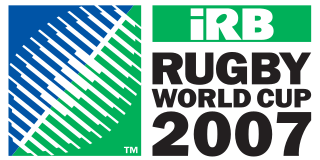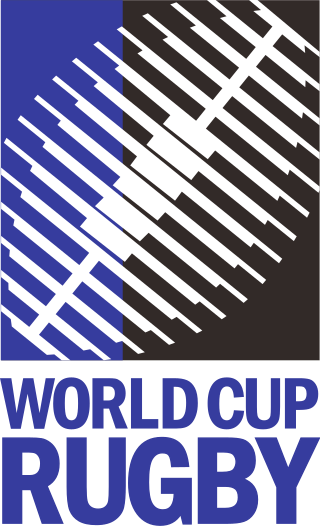
The Men's Rugby World Cup is a rugby union tournament contested every four years between the top international teams, the winners of which are recognised as the World champions of the sport.

The 2007 Rugby World Cup was the sixth Rugby World Cup, a quadrennial international rugby union competition organised by the International Rugby Board. Twenty nations competed for the Webb Ellis Cup in the tournament, which was hosted by France from 7 September to 20 October. France won the hosting rights in 2003, beating a bid from England. The competition consisted of 48 matches over 44 days; 42 matches were played in 10 cities throughout France, as well as four in Cardiff, Wales, and two in Edinburgh, Scotland.

The 1987 Rugby World Cup was the first Rugby World Cup. It was co-hosted by New Zealand and Australia – New Zealand hosted 21 matches while Australia hosted 11 matches. The tournament was won by New Zealand, who were the strong favourites and won all their matches comfortably. New Zealand defeated France 29–9 in the final at Eden Park in Auckland. The New Zealand team was captained by David Kirk and included such rugby greats as Sean Fitzpatrick, John Kirwan, Grant Fox and Michael Jones. Wales finished third, and Australia fourth, after conceding crucial tries in the dying seconds of both their semi-final against France and the third-place play-off against Wales.

The 1995 Rugby World Cup, was the third Rugby World Cup. It was hosted and won by South Africa, and was the first Rugby World Cup in which every match was held in one country.

The 2011 Rugby World Cup, was the seventh Rugby World Cup, a quadrennial international rugby union competition inaugurated in 1987. The International Rugby Board (IRB) selected New Zealand as the host country in preference to Japan and South Africa at a meeting in Dublin on 17 November 2005. The tournament was won by New Zealand, who defeated France 8–7 in the final. The defending champions, South Africa, were eliminated by Australia 11–9 in the quarter-finals. The result marked the third time that the tournament was won by the country that hosted the event.

The IRB2015 Rugby World Cup was the eighth Rugby World Cup, the quadrennial rugby union world championship. The tournament was hosted by England from 18 September to 31 October. Of the 20 countries competing in the World Cup in 2011, there was only one change: Uruguay replaced Russia. This was the first World Cup with no new teams to the tournament.

The Super 10 was a rugby union football tournament featuring ten teams from Australia, New Zealand, South Africa, Tonga, and Western Samoa. The competition ran for three years from 1993 to 1995 and was the predecessor of Super 12 and Super 14, now known as Super Rugby.

The Rugby Africa Cup is a two-year men's rugby union tournament involving the top 16 African nations based on their World Rugby rankings, it is organised by Rugby Africa. The tournament was first held in 2000. It was renamed the Rugby Africa Cup in November 2019, it was previously called the Africa Cup since 2006, the CAR Top 9 and CAR Top 10.
The 2007 Africa Cup was the eighth edition of highest level rugby union tournament in Africa. The competition involved twelve teams that were divided into two zones. Each zone was then divided into two pools of three. Each pool winner then qualified for a semi-final; the semi-final winners then played each other in the final.
The 2008–09 Africa Cup is the ninth edition of highest level rugby union tournament in Africa. The competition involves twelve teams that are divided into two zones. Each zone is then divided into two pools of three. Each pool winner then qualifies for a semi-final; the semi-final winners then play each other in the final.
The 2008 CAR Development Trophy, also known as the 2008 Africa Junior Trophy, was the fifth edition of second level rugby union tournament in Africa. The competition involved thirteen teams that are divided into three zones. In the north there were two pools of three teams. In the 2008 edition Botswana, Swaziland and Nigeria did not participate, due to involvement in the World Cup qualifiers.
The 2013 Varsity Cup was contested from 4 February to 8 April 2013. The tournament was the sixth season of the Varsity Cup, an annual inter-university rugby union competition featuring eight South African universities.

The Gold Cup is the premier rugby union club competition in South Africa for non-university teams.

The EPCR Challenge Cup is an annual rugby union competition organised by European Professional Club Rugby (EPCR). It is the second-tier competition for clubs based in European leagues behind the European Rugby Champions Cup. From its inception in 1996 to 2014, it was known as the European Challenge Cup and governed by European Rugby Cup (ERC). Following disagreements in the structure of the tournament's format and division of revenue, the English and French leagues withdrew to form the EPCR, which organized the Challenge Cup and the Champions Cup since the 2014–15 season.
The 1999 South Africa Sevens was an annual rugby sevens tournament that took place at the Danie Craven Stadium in Stellenbosch between 10 and 11 December 1999. It was the first edition of the South Africa Sevens with it being the second leg of the 1999–2000 World Sevens Series. Sixteen teams competed in the tournament and were divided into four groups of four with the top two teams qualifying for the quarter-finals.
The 2018 Hong Kong Sevens was the 43rd edition of the Hong Kong Sevens tournament, and the seventh tournament of the 2017–18 World Rugby Sevens Series. The performance from this tournament determined the first fourteen seedings of the 2018 Rugby World Cup Sevens tournament alongside the past year's series and the previous six event of the 2017–18 season.
The 2021 Men's Rugby League World Cup qualification was the qualifying process which will decide the 8 teams that would join the 8 quarter-finalists from the 2017 World Cup including the hosts England, who received an automatic spot, at the 2021 Rugby League World Cup. The process commenced in June 2018, with the commencement of the 2018–19 Rugby League European Championship C tournament, which acted as the first round for European qualification.

The 2021 Rugby World Cup was the ninth staging of the women's Rugby World Cup, as organised by World Rugby. It was held from 8 October to 12 November 2022 in Auckland and Whangārei, New Zealand. It was originally scheduled to be held in 2021, but was postponed by one year due to the COVID-19 pandemic.
2018 Varsity Rugby was the 2018 edition of four rugby union competitions annually played between several university teams in South Africa. It was contested from 29 January to 16 April 2018 and was the eleventh edition of these competitions.
The 2021–22 Rugby Africa Cup, which doubled as Qualifying for the 2023 Rugby World Cup for Africa began in June 2021, where teams competed for one direct qualification spot into the final World Cup tournament and for one place in the final Qualification Tournament.










